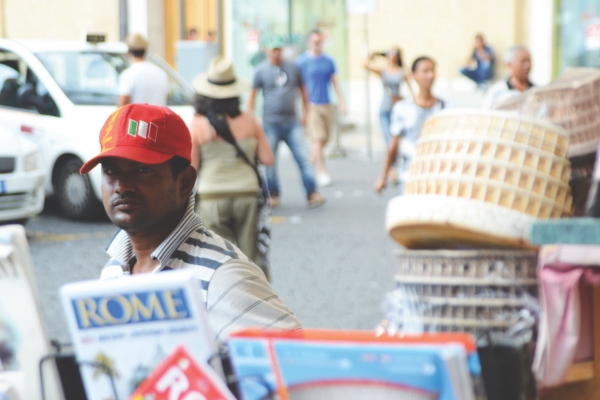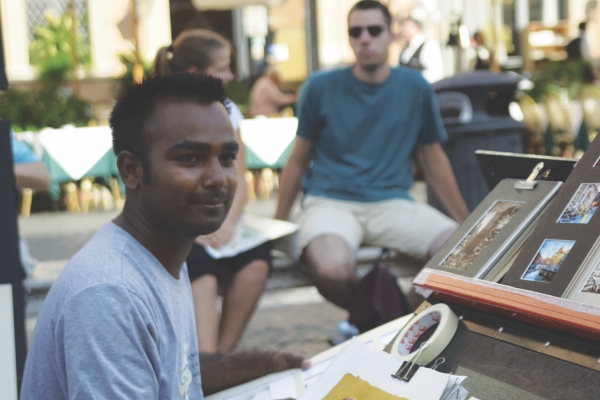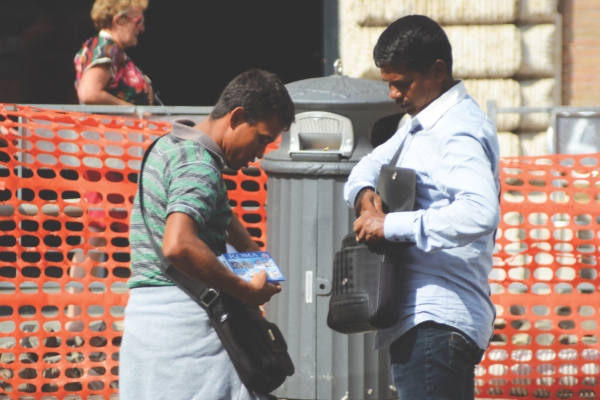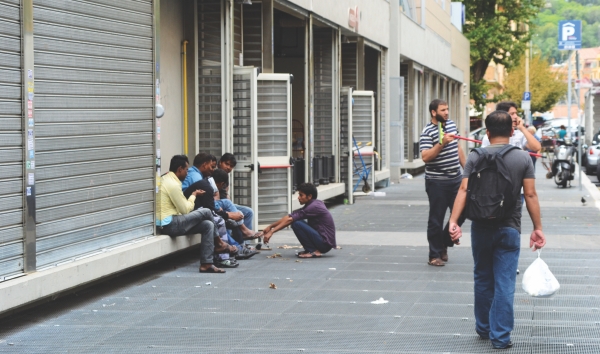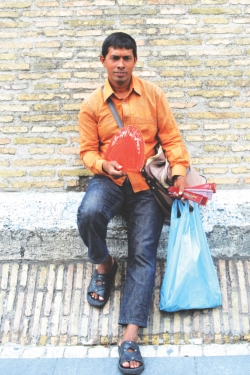| Home - Back Issues - The Team - Contact Us |
 |
| Volume 11 |Issue 36| September 14, 2012 | |
|
|
Cover Story IN PURSUIT OF HAPPINESS Millions of Bangladeshis dream of a better life abroad, but once there, many find themselves in desperate situations of debt, illegality, and even homelessness. Italy is the second most popular European destination for Bangladeshi immigrants but with the Eurozone's financial crisis deepening and unemployment rising, the Mediterranean country is proving to be a tough new home. Soraya Auer Photos: Max Toomey
In the beautiful countryside 100km outside of Italy's capital, Rome, vegetables native to Bangladesh, such as bitter gourd, okra and pumpkin, are being grown. Hundreds of acres of land are cultivating all kinds of vegetables to meet the needs of the Asian community, not just in Rome or even Italy but all over Europe. The brains behind this agricultural goldmine are not Italian farmers on their iconic scooters but Bangladeshi ones on bicycles. This is not the first instance in which an immigrant community has arrived in a new country and successfully entered the world of farming. A hundred years ago, Sikhs in California turned their lives around by becoming landowners after years of working hard as fruit farmers. They are now some of the richest in that part of the United States. One enterprising Bangladeshi, who may well be following the example set by the Sikhs of California, is Mohammed Jashim. After 29 years in Italy, the 45-year-old dual citizen owns three successful fruit and vegetable shops and makes a monthly profit of €20,000 (Tk 20,00,000). Another fruit and vegetable shop owner a few streets away from the Vatican has been living in the city for 12 years and speaks fluent Italian, which he uses to joke with the Italian men and compliment the Italian women. His business is flourishing and he recently acquired the shop next door which he turned into a sandwich bar. But behind these successful Bangladeshi businessmen are other less successful and independent Bangladeshis, sometimes relatives, employed to run these shops. Farhan came to Italy 18 months ago and works as a fruit and vegetable shop assistant. He says, “I could see no future for myself [in Bangladesh]. I was in college, but there is just too much uncertainty, too much insecurity.” He persuaded his father to sell his land and pay for his ticket to Rome where his current employer would sponsor him. The whole process cost him 4 to 5 lakh taka. Is he happy? “Not really, I am homesick and I will go back but not yet. I need to make some money first,” he explains. Samad Hasan works as a waiter in a cafe by the Spanish Steps. He came to Rome 14 years ago with his wife and children but his family intends to return to Bangladesh. He says, “Both my wife and I have Master degrees from Dhaka University. She found a job as a lecturer at North South University in Dhaka so is going back. I will join her too soon because I would rather have a more dignified life back home than serving tea to tourists.” Farhan and Samad, however, are quite lucky compared to many other Bangladeshis who have arrived in Italy in the past few years. This is because, while all legal immigrants have a sponsor, not many are actually employed by their sponsor once they arrive and many have had to cough up more than 10 lakh taka to middlemen who secure them their sponsor.
Iqbal Hossain, from Comilla, arrived in Italy in late 2007 on a work permit. “Going to Italy as a labourer was my only way,” explains the 28-year-old. “The Italian coal company didn't actually need workers but they say they have vacancies to bring over Bangladeshis.” Iqbal says that while the coal factory is a real place, the whole process was a front to get a visa and once there, he had to sign a paper saying he had resigned of his own free will so that he could go and find himself another job. The polytechnic college graduate says, “It's a business for the owner of the coal factory. They're not kicking us out of a job – we're using them to get over to Italy. Almost everyone does this. The Italian Government won't let us come to Italy without legal work so we have to do this to show the Embassy.” Giorgio Guglielmino, the Italian Ambassador to Bangladesh, says, “[Scam sponsorships] is something that we know, unfortunately, happens but it's a very delicate kind of relationship between the Bangladeshi and his employer. Because on the one hand the Bangladeshi knows this is a bad guy, taking his money, but on the other hand, he is giving him an opportunity. So it's very difficult to convince the Bangladeshi to report this guy to the police, especially if he thinks he'll be sent back to Bangladesh if he reports him.” While 'fake' Italian sponsors play a huge part in this scam, Iqbal says it comes down to entrepreneurial Bangladeshis who have set up a network of middlemen, both in Bangladesh and in Italy. “Bangladeshi people have a tendency to make a business out of anything. A while back, the Bangladeshis in Italy wouldn't charge for helping but when they saw the Bangladeshis in Bangladesh were doing it, they started too. The Italians didn't charge so much either but for the sake of business, they charge a lot more now.” He estimates that for every €3,000 an Italian is expecting to be paid, €7,000 has to be given to the Bangladeshis in Italy. The Italian ambassador believes middlemen approach hopeful immigrants in queues outside the Italian visa agency's office and is therefore considering eliminating the queue completely and using an online system. He says, “Of course [this] means the middlemen might offer to help people to fill out the online forms – so it's a constant battle. We really need to, on every possible occasion, tell [applicants] not to waste their money and their life – because if somebody has to put together €10,000, he sells his land or borrows money, and if he doesn't get the visa, his life is ruined.”
Despite the risk, thousands of Bangladeshis have taken this gamble and for some, it has paid off. “I didn't have to sell land but I did have to take my father's pension money,” says Iqbal. “It was all managed by my cousin and other Bangladeshis. I spent 1 lakh taka on my flights and visa fees and gave my cousin 14 lakh taka, but I don't know how much he gave the Italian.” He concludes, “This is the system to go to Italy and there is no other way.” Munir, a salesman on a shoe stall on Via Cola di Rienzo in Rome, says, “It's easy to get a visa if you can get someone settled here to sponsor you. The Italian police don't bother you, and they don't deport like in other countries.” He adds, “In fact, Italy is quite like Bangladesh, easygoing, chaotic, and a lot of fiddling of taxes and VAT,” he smiles, “I feel quite at home.” However, another Bangladeshi stall keeper on the same street says he's not happy with Italy after living in Rome for four years. “Italians can be difficult. I'm planning to stay another three years, and then I'd like to go to the UK. I've got cousins working in London.” Wishing to stay anonymous, he explains that he lives with 12 other Bangladeshis in a three-bedroom apartment and that this is a common housing arrangement in cities. Each of them spends around €300 (Tk 30,000) on rent, food and living expenses and sends the rest home to family. “We get picked up in a van in the morning and get dropped off here, work all day, and then get taken back.” His colleague admits to earning €50 (Tk 5,000) a day in cash. Not a significant amount by any European standards, but he points out, “I earn in days what you [in Bangladesh] earn in a month.” Italy hosts approximately 100,000 legal Bangladeshi workers. The number of illegal immigrants fluctuates depending on who you ask, but according to official Italian estimates, the number is in the region of 20-50,000. Over a 12-month period between 2011 and 2012, the millions of Bangladeshi expatriates across the globe raised almost $12 billion in remittance and the sizeable number of immigrants in Italy were a part of that. “I think the UK is a special case – for the history, tradition, or whatever it is – and if you leave it out, Italy is the number one European destination for Bangladeshis,” says Italian Ambassador Giorgio Guglielmino. “I repeat this to everyone I meet including the Prime Minister: the Bangladeshi community is not only hard-working but it is also a very quiet one. We have other communities in Italy which I would say are infamous for being very much in involved in drug trafficking or prostitution while the Bangladeshis are not involved in organised crime. I always say that the fact you don't get on the front pages is your best credential.”
The Italian ambassador believes, “One of the very positive things that we have is the legislation regarding work. We have a minimum wage which may not be very high compared to the standard of living, but it is very high compared to the minimum wage offered in other countries that are destinations for working Bangladeshis.” He says, compared to the $100-150 (Tk 8-12,000) some other countries offer a month, Italy's guaranteed minimum wage of €750 ($960 and Tk 75,000), is “pretty good.” Guglielmino adds, “The Bangladeshis can manage to live in a very simple way. The money is what makes the work satisfying. They manage to send back a lot of money. We are negotiating now a system where they will not pay or pay an insignificant amount to transfer money back to Bangladesh.” Iqbal would agree with this as he says he has been able to save around €1,200 (Tk 1,20,000) a month over the past four years with his job in computer graphics. “I'm satisfied with my work and I'm happy. Not everyone can earn this amount of money. People who don't get fixed jobs have lots of problems and for them, it can be devastating.” On hearing how many like Iqbal pay €12,000 to enter Italy, Guglielmino is surprised. “That's incredible. It's a constant battle against these sketchy middlemen who ask for money. I think, unfortunately, it's a little bit in the Bangladeshi mentality to use somebody to get something so it's not easy to pass the message that you don't have to use any middlemen. I mean you either have the right to a visa or you don't. If you don't, I'm sorry, but I can't just let everyone go, especially considering we let a lot of people go.” In the first six months of 2012, 4,700 working visas, 1,800 family union visas (for wives and children only) and 241 student visas (a notable rise on last year's figure of 164) were issued. “6,500 in six months means that even now in a period of crisis we are opening Italy to 13,000 Bangladeshis every year,” states the Italian Ambassador. Wander the streets of Rome on a summer day and at every tourist site, be it the Vatican, the Colosseum or Fontana di Trevi, you will find Bangladeshi men trying to sell sun umbrellas, fans, water bottles and guides to hot and sticky tourists. Do the same again at night and many of these men will have swapped these goods for a bunch of roses to sell to slightly less sticky people sitting in restaurants and piazzas (squares). It is not an easy job even for a fluent Italian speaker, and most of these Bangladeshis are recently arrived with poor Italian or illegal and therefore cannot get better work. Many say that for five months of the year, they can make some money, but for the rest of the year, it's a real struggle. Amena Hossain, a Bangladeshi who works for an NGO based in Rome, says, “Earlier this year, I came across a pitiful Bangladeshi youth, in flimsy shirts and light sweaters, in midst of snow and slush selling roses to the few pedestrians still out and about like myself. When I spoke to him in Bangla, his face broke out in a big smile. He was a college graduate from Gaibanda who had left home and got a sponsor to Rome, but now couldn't get a job. 'Any job would be more dignified than selling flowers,' he said. He gave me his name, number and showed me his permit to stay – all he wanted was a job that would get him off the streets. He thrust the rose in my hand and wouldn't take any money for it but I felt sorry and gave him €10 for a single rose. Suddenly, from nowhere, another Bangladesh man materialised, also from Gaibanda also offering me a rose. When I gave him a €20 note, instead of giving me change, he immediately pocketed the note and disappeared.” While the experience hasn't put Amena off finding out the stories of these men on the streets, she's become a bit wiser. She adds, “That one had obviously been peddling roses for longer!”
A few weeks ago, Amena encountered three more rose sellers one evening while dining in a trattoria in the Tuscan town of Arezzo. Liton, 30, was educated and could speak English and Italian. He insisted he was from India until his Bangladeshi accent gave him away. He said he makes €50 a night and more doing odd jobs during the day. “He said he came eight years ago and I could see he was very persistent with customers, targetting tables where there were young couples. He said he was very busy – couldn't waste time talking to me – night time was busy for him. When I asked him if he missed home, he replied, 'There's no point in being sentimental.'” Twenty minutes later, an older and quiet man came in. He lit up when Amena spoke to him in Bangla and said he was from Brahmanbaria but unlike Liton, believed business was very bad, making only €20 a day. “Jamshed is an educated man, who used to work in a travel agency in Sylhet. He came a couple of years before under a legal sponsorship scheme but paid a dalal, an agent, Tk 800,000 after hearing from there was good money to make. He was an agricultural worker but the economy was so bad he couldn't find any more work,” explains Amena. The third man, Rifat Khan, is young and nervous looking. “He's almost illiterate, couldn't give his age accurately,” remembers the NGO worker. “He arrived only four months ago and admitted he is illegal. He was working in Saudi Arabia for a rich Saudi, cleaning his swimming pool until three years ago. After being fired, he stayed illegally until he was picked up and deported.” When back in Bangladesh, Rifat married and had a baby. But unable to find work, while his wife was pregnant again, he sold his house and wife's jewellery to raise eight lakh taka and then borrowed another lakh taka to give to an agent for a tourist visa to Italy. “Because he doesn't have a permit, he can't even work in agriculture,” says Amena. “He makes €10 a night, sometimes €20 but has only been able to send back his wife Tk 40,000, which is not enough for her to survive and pay off the loan.” According to other Bangladeshis, he is waiting for an amnesty later this year which will allow him to legalise his stay – but he believes that will cost him another 6-7 lakh taka for an agent to arrange for him. Desperate to pay back his loan, he says he wouldn't have come to Italy had he known how bad things are.
What is more heartbreaking is that, according to the Italian ambassador, there will not be another amnesty. He explains, “It's a very sensitive issue in Italy because there are some political parties that think you kind of sponsor the future illegal immigrants to come, which is partly true. It's not the best solution because it's not a final solution, it's a temporary one. For the moment, we stopped with this kind of amnesty and don't have it anymore.”
Italy is a unique country as only a century ago, Italians went in droves to the United States or South America to make their fortunes and now they host thousands of Bangladeshis hoping to do the same in their country. Guglielmino says, “The desperation these people have to get out of their country to find a better life is a little bit like the Italians mainly between the First and Second World War. It's amazing because we have thousands of stories of people going to the harbours either in Naples or Genoa, not knowing even where they were going because it depended on the next ship that was going to depart.” For Bangladeshis, that uncertainty is still very real. While NGOs and micro-credit organisations like Brac and Grameen place great emphasis on empowering women and girls, young men who don't wish to enter the mosque or partisan politics are of the belief that their only solution lies outside of the country. Those who succeed can return with their heads held high and set up a business, but more often than not, those who don't find a bigger hole in their lives than the one they left behind. Migration is the oldest human story and will perpetually (and often successfully) continue with globalisation. But when a young Bangladeshi man standing on a Roman street, selling you something he wouldn't want to be seen selling back in his own home town, says “Apa, do you think if we believed in our political leaders we would have left home?” – is that really a fulfilled dream for happiness? Some names and details were changed in this article to protect the privacy and safety of the individuals featured. |
||||||||||
Copyright
(R) thedailystar.net 2012 |

